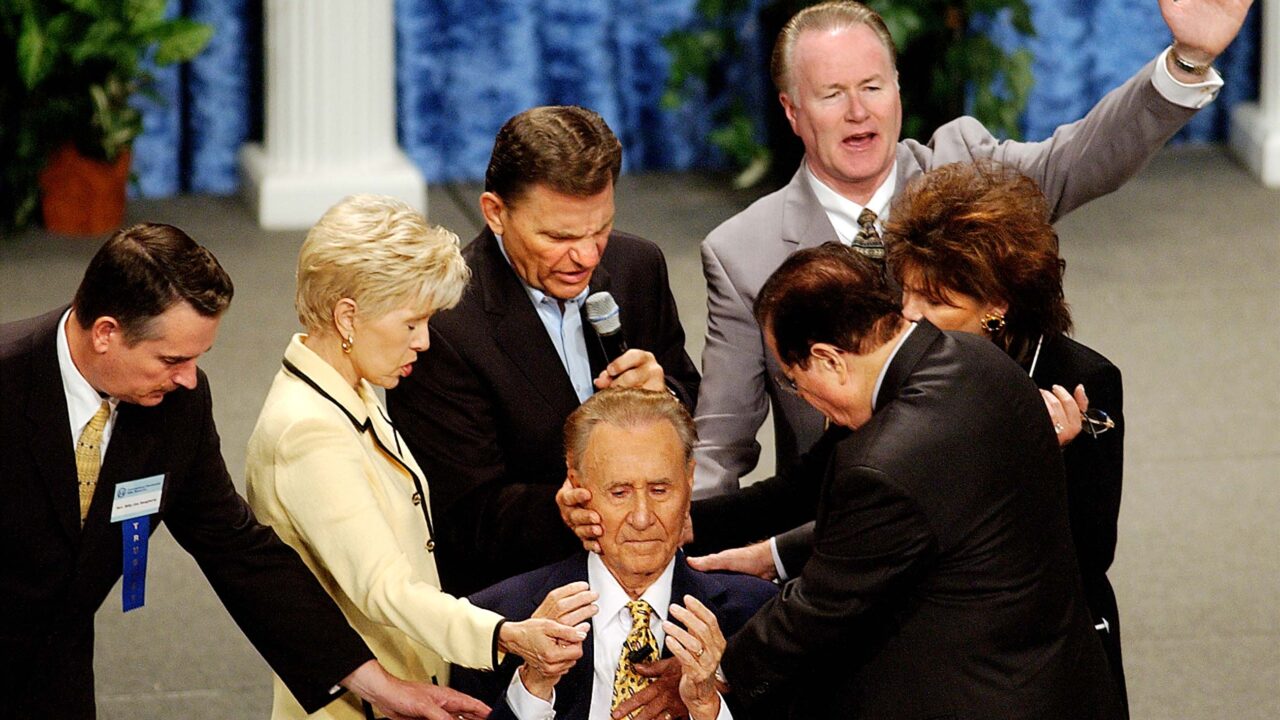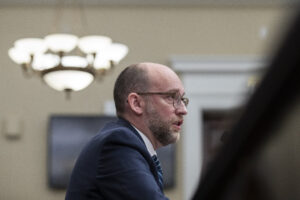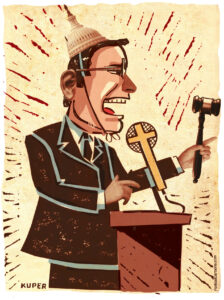These Christians Think God Needs You Rich and to Rule the World
Wealthy megachurch televangelists are blending what’s known as the “prosperity gospel” with nationalist politics. Televangelists lay hands on Oral Roberts, 85, during the International Charismatic Bible Ministries conference. Photo: Tulsa World, Kelly Kerr / AP
Televangelists lay hands on Oral Roberts, 85, during the International Charismatic Bible Ministries conference. Photo: Tulsa World, Kelly Kerr / AP
This article was originally published by the Texas Observer, a nonprofit investigative news outlet. Sign up for their weekly newsletter, or follow them on Facebook and Twitter.
On August 3, 2009, Texan televangelist Kenneth Copeland gave an impassioned sermon to a crowd of more than 9,000 at the Southwest Believers Convention in Fort Worth amid one of the worst economic downturns in American history.
“God needs you saved,” said Copeland, the wealthiest pastor in America. “He needs you filled with the Holy Ghost. He needs you well. And he needs you strong. And he needs you rich.”
These words may strike those unfamiliar with Copeland’s preaching as an odd thing to say to an audience overburdened with debt. But they’re emblematic of the heady world of the Word of Faith, a nondenominational Christian movement pioneered by another Texan, Kenneth Hagin. Word of Faith goes by many names—Word-Faith, the Faith movement, Positive Confession—and is most well known for promoting the prosperity gospel, the notion that true believers can use their words to bring about supernatural blessings and material well-being.
“The central premise is that God wants you to be healthy and wealthy,” said Matt Sutton, a religious historian at the University of California, Santa Barbara. “How you do that is by having absolute faith in God. And part of demonstrating that you have absolute faith is using your words. The idea is that you can manifest physical change by speaking it into existence.”
Leading Word of Faith preachers like Copeland, who refused to cooperate during a 2008 Senate Finance Committee investigation into allegations of improper financial activity, have amassed enormous wealth and massive congregations through their wide-reaching televangelist broadcasts, which ask followers to donate as a demonstration of their faith with the promise that God will reward them in turn.
Some scholars see this highly politicized and rapidly growing nondenominational formation as the successor to conservative Evangelical Christianity that has played a significant role in Republican politics.
According to Kate Bowler, a professor of American religious history at Duke Divinity School and author of Blessed: A History of the American Prosperity Gospel, 30 percent of the country’s 50 biggest churches follow Word of Faith-inspired teachings, and more than 60 percent of prosperity gospel congregations exceeded 5,000 members in 2010. Texas is home to at least 11 Faith-style megachurches, including Benny Hinn Ministries in Grapevine, whose headquarters the IRS raided in 2017. In recent years, they’ve increasingly blended prosperity theology with a particularly strident strain of Christian dominionism that seeks to implement Christian rule over every aspect of society.
Some scholars see this highly politicized and rapidly growing nondenominational formation as the successor to conservative Evangelical Christianity that has played a significant role in Republican politics.
“Denominationalism is over,” said Anthea Butler, chair of the University of Pennsylvania’s Department of Religious Studies. “And as a matter of fact, these people have subsumed evangelicalism. This is the wave of the future.”
Kenneth Hagin, the “spiritual father” and the “apostle” of the Word of Faith movement, was born in McKinney in 1917. In his 1984 book, I Went to Hell, Hagin said that congenital heart and blood conditions brought him to the gates of Hell three times in 1933. When Hagin proclaimed Jesus as Lord, he said he did not return to Hell, which he saw as confirmation of his salvation. One year later, Hagin said he was healed and received a revelation from God. Three years later, he gave his first sermon.
After his spiritual awakening, Hagin became an itinerant preacher, participating in healing revivals across Texas in the 1940s and 1950s. He formed his ministry in Garland in 1963, which he later relocated to Tulsa, Oklahoma, in 1966. In Tulsa, Hagin established Rhema Bible College and networked with other figures who would become luminaries of the Word of Faith movement. Among them were Oral Roberts—an early prosperity gospel teacher and founder of Oral Roberts University—and Copeland, who participated in one of Hagin’s earliest revival events, known as Campmeetings, in 1978 and later served on the board of Oral Roberts University.
Before Hagin’s rise to prominence, only a small minority of Christians adopted the prosperity gospel, but it spread rapidly as preachers like Copeland established their megachurch ministries and broadcast networks. In the 1980s, Word of Faith style teachings became commonplace in the charismatic Christian community—a broad grouping of Christians who participate in ecstatic worship services that feature healing, speaking in tongues, and the belief in the everyday experience of miracles, spiritual blessings, and other supernatural occurrences. In 1985, a Charisma Magazine poll named Hagin and Copeland among the most influential charismatic leaders, along with the late Pat Robertson, a televangelist also known for his health-and-wealth-style gospel who melded charismatic Christianity and conservative politics on the Christian Broadcasting Network and the Christian Coalition.
After Hagin died in 2003, Copeland’s lucrative televangelism ministry positioned him as the heir apparent to the Word of Faith throne. This year, he was the headline speaker at the annual Word of Faith Convention as well as his annual revival meeting, the Southwest Believers Convention, which gathers a host of private jet-owning prosperity gospel preachers such as Jesse Duplantis and Jerry Savelle—two major televangelists who both served on the board of Oral Roberts University alongside Copeland before a financial scandal led to a shakeup. In recent years, Copeland’s ministry has taken a turn toward the political. Copeland was among the earliest independent charismatic preachers to gather around former President Donald Trump in the run-up to the 2016 election. He prayed over Trump in 2015, endorsed him in the 2020 election, and said the devil was trying to steal the election from the former president ahead of January 6.
While the politicization of the Christian faith is not a new development, there’s something novel in Copeland’s political turn.
The Word of Faith and the New Apostolic Reformation movements are not denominations with formal statements of belief but are part of an interrelated network of ministries and church leaders that share a lingua franca.
“They’ve brought prosperity gospel and dominionism together in a new and interesting way,” Butler told the Texas Observer. “The intersection of dominionism is something that started occurring in the 2000s. But what really ramped it up was Trump. … And now they are now being more explicitly political.”
The particular strain of dominionism promoted by Copeland, Seven Mountains Dominionism—a theology that calls for Christians to rule over the seven domains of family, religion, education, media, entertainment, business, and government—has its roots in what’s called the New Apostolic Reformation, a movement of self-described prophets and apostles founded in the late 1990s that seeks to establish Christian supremacy. A part of the larger independent charismatic Christian community, the Word of Faith and the New Apostolic Reformation movements are not denominations with formal statements of belief but are part of an interrelated network of ministries and church leaders that share a lingua franca.
“The worship music, the spiritual warfare rhetoric, and the Seven Mountains language have become a way that everyone can kind of plug into these ideas and participate,” said Matthew Taylor, a scholar at the Institute for Islamic, Christian, Jewish Studies and the creator of the audio documentary series Charismatic Revival Fury: The New Apostolic Reformation, which details the role of networks of extremist Christians in the instigation of the January 6 insurrection.
This synthesis of prosperity theology and dominionism is most clearly distilled in Flashpoint, a political news program produced by Kenneth Copeland Ministries that started during the 2020 election cycle and has since featured leaders of the New Apostolic Reformation such as Lance Wallnau, self-proclaimed prophet and author of several books on Seven Mountains Dominionism. Flashpoint has also featured right-wing political figures such as Mike Lindel, a pillow salesman and debunked election conspiracy theorist, and Michael Flynn, a disgraced former general affiliated with the QAnon movement whose ReAwaken America tour similarly blends conservative, charismatic Christianity with conspiracism.
“We need to think about these things as counterparts,” Butler said. “They’re cousins.”
Your support matters…Independent journalism is under threat and overshadowed by heavily funded mainstream media.
You can help level the playing field. Become a member.
Your tax-deductible contribution keeps us digging beneath the headlines to give you thought-provoking, investigative reporting and analysis that unearths what's really happening- without compromise.
Give today to support our courageous, independent journalists.




You need to be a supporter to comment.
There are currently no responses to this article.
Be the first to respond.